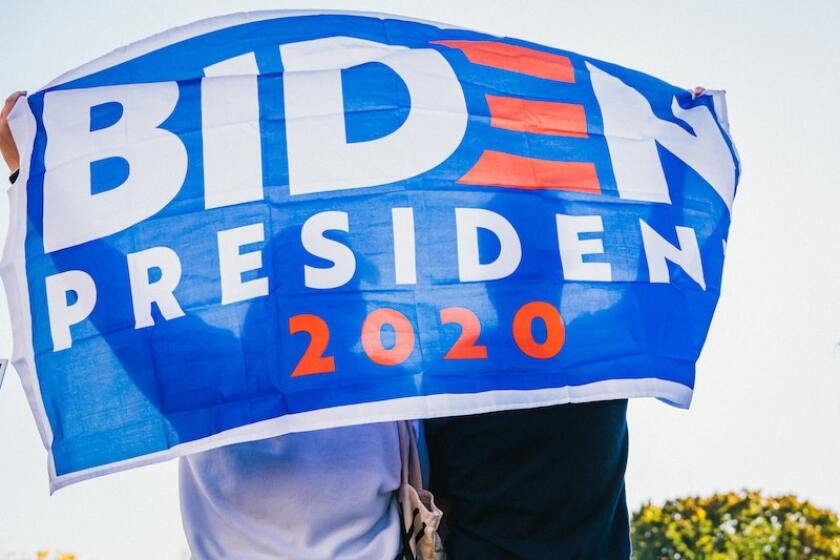On Saturday morning, Democratic nominee Joe Biden was declared winner of the US presidential election and claimed the White House, following days of uncertainty.
Finally surpassing the required 270 electoral college votes mark, after claiming victory in a closely fought Pennsylvania race, US voters ensured that the Democratic Party will hold two of the three branches of Congress. Biden is also leading the popular vote, but certain states including Georgia and North Carolina are yet to be fully called.
However, it looks like the Democrats may have been unable to flip the Senate, and as such may not have legislative authority in a fiercely divided Congress come January. This would make it increasingly difficult for the Biden administration to enact legislation without the support of a Republican Senate.
Both Senate seats available in Georgia are heading for a runoff as neither candidate was able to surpass the 50% needed to win senatorial elections. These elections are set for January 5 and will likely gain significant attention globally due to their impact on the Senate majority. A 50-50 tie in the Senate would give Vice President Kamala Harris the casting vote.
Speaking last Monday at the International Bar Association's annual conference, John Kerry, former Democratic presidential candidate and Secretary of State from 2013 to 2017, outlined the importance of Biden winning in such a clearly defined manner.
“I want everybody to think about what the upside is. It’s a message of repudiation of Trumpism, repudiation of suppression, and an affirmation of American democracy such as no president, no house of Congress, no op-ed or anybody else could achieve,” he said. “The American people have spoken in a rather remarkable way that sends a message around the world that America is back. Prior even to a president announcing that we're back.”
Impacts
While a Biden victory was set to have a huge impact on the financial industry, the lack of a Democratic Senate means that his government is likely to face opposition at every turn. Much of the regulatory change that can be enacted by regulatory bodies like the Securities and Exchange Commission (SEC) and the Commodity Futures Trading Commission (CFTC) however does not need Senate approval, and can therefore be enacted following a change in personnel.
See also: US Election 2020: what a Biden-Harris admin would mean for the regulators
“A Biden presidency with a Republican Senate is not a bad scenario for the financial markets. It means stocks go up, the US dollar actually stabilises because you are avoiding the capital outflows scenario of the loss of the US corporate tax haven status, and US Treasuries will flatten,” said Charlie McElligott, managing director for cross-asset strategy at Nomura Global Markets.
“This is the opposite of what the market has been pricing over the last month and a half. Qualitatively we have just avoided the sudden shock policy change with regards to implications of unchecked deficit spending impact as ultimately what would potentially be an inflation catalyst,” he added. “That would be a paradigm shift that the market frankly hasn't operated under for well over a decade.”
This is because the Republican Senate will be able to push back on a Democratic House and the White House.
While Biden did not run his campaign with particularly strong economic policies, it still seems likely that he will look to undo many of the deregulatory actions taken by Trump over his term.
“Containing the pandemic won’t be enough to repair the damage President Trump has done to our economy and to the American people,” wrote Biden in the Biden-Sanders Unity Task Force document this July.
See also: US election 2020: what a Biden Harris administration would mean for financial regulation
“The scars of the financial crisis that triggered the great recession are still present in our economy and our society. Banks should never be 'too big to fail'. Democrats will work to reverse the over-financialisation of the American economy by maintaining and expanding safeguards that separate retail banking institutions from more risky investment operations,” he continued.
“We will strengthen and enforce the Obama-Biden administration’s Dodd-Frank financial reform law to protect American workers from the impacts of future financial crises. And when justified by the law, we will back criminal penalties for reckless executives who illegally gamble with the savings and economic security of their clients and American communities.”
Rollbacks
A lot of the regulatory changes that have been made by the Trump administration over his term, at least within the banking sector, tended to be smaller changes at the margins of larger regulations. A new regulatory framework was installed in the aftermath of the financial crisis – mostly under the Dodd-Frank Wall Street Reform and Consumer Protection Act – and Trump has done his best to deconstruct this.
“Now we are actually going to see the reverse – you will see a rollback of the rollback. Right now the Biden transition team, in addition to sketching out what priorities they may have in the first 100 days on the legislative side, is also looking at what regulatory changes the Trump administration advanced,” said Paul Thornell, principal at DC lobbying firm Mehlman Castagnetti Rosen & Thomas.
Whether this be Dodd Frank or in other areas like the environment, healthcare or energy, US legislation will likely be dialed back to where it was four years ago where possible.
See also: Election 2020: what next for Elizabeth Warren
The Obama administration made a lot of changes during its early years; passing Dodd-Frank, implementing the Volcker Rule, introducing a whole new system for the stress testing of large banks, a new set of capital rules. In comparison, over the last three or four years, there have only been relatively small, more targeted changes.
“The Trump administration didn't do that much in financial regulation, and certainly not in terms of legislation. Even in regulation, it's not been as active as maybe some people expected it to be, and it's likely to be similar with Biden,” said Nicolas Véron, senior fellow at the Peterson Institute for International Economics. “When you look at the Biden platforms there isn't much about financial regulation at all.”
Personnel is policy
One of the key areas where Biden will be able to make clear, impactful changes is in key leadership positions and personnel within the regulatory agencies, and at the executive level.
Given the results of the election, it is highly likely that key positions of authority – including Jay Clayton at the Securities and Exchange Commission (SEC) and Treasury Secretary Steven Mnuchin – will soon be vacated and filled by Democratic leaning candidates.
“The Democrats will definitely appoint a new chairman of the SEC – there’s no question about that. All the divisional directors will also change. Most importantly there will be significant policy changes,” said Mark Berman, CEO of CompliGlobe and potential director of the Office of International Affairs at the SEC.
“They will install people who can roll back some of the positions taken by the SEC, the CFTC and the banking regulators during this administration, like the Volcker Rule,” he added.
Key regulatory changes remain uncertain, but it is likely that Biden will look to address issues like the Community Reinvestment Act and cannabis banking, and may potentially look at reintroducing the measures previously brought about under the Glass-Steagall Act 1933.
International arena
It is no secret that President Trump alienated the US from some of its closest overseas allies, and deepened trenches between already traditional adversaries.
Biden has made it clear throughout his campaign that he intends to repair some of the damage done on the global scene and will likely make reentering the Paris Accords one of his first acts as president.
In his victory speech, delivered last Friday in Wilmington, Delaware, Biden signified his intention to rebuild the reputation of the US on the world stage.
"I sought this office to restore the soul of America. To rebuild the backbone of the nation — the middle class. To make America respected around the world again and to unite us here at home," he said.
Congratulatory messages came in from numerous world leaders around the world from countries including the UK, Germany, Israel, South Korea and Iran.
French President Emmanuel Macron also posted a tweet, writing: The Americans have chosen their President. Congratulations Joe Biden and Kamala Harris! We have a lot to do to overcome today’s challenges. Let's work together!"
Biden's outlined vision clarified his position on many of the global issues he wishes to address, and once he has taken office and appointed a Secretary of State work will start on doing so.
“Vice President Biden has made it clear that he intends to go back to the Iran nuclear agreement, but he intends to go further than that,” said Kerry. “We need to deal with Iranian engagement in various parts of the Middle East, we need to deal with the weapons going to Yemen and with the support for the war with Putin.”
Other areas Biden will look at include conflicts including Hezbollah, Iran, Syria and Israel, as well as Iraq and Saudi Arabia.
“There's a lot on the table. We knew that when we negotiated last time,” he added.
The relationship with China and Russia will also be incredibly relevant over the next four years.
See also: China responds to aggressive moves in US capital markets
Despite its position as the world's second-largest economy, Trump has been unwilling to work with China and has led the US into a major trade war with the country.
“No one in all of history has ever won a trade war. Trump didn't win this trade war – it is still going on – all he did was get back to the point where there is a dialogue twice a year with China on economic and security issues. We already had that,” said Kerry.
“Has there been any change in intellectual property being stolen as a condition of doing business? No. The fact is that he hasn't succeeded; he hasn't achieved anything, and the way you best achieve that is by working with friends and allies.”
Biden is a multilateralist, whereas Trump is a bilateralist. Biden has a background in foreign relations, which Trump lacks.
Harry Broadman, an economist who worked on the 1988 trade bill as a Senate committee staffer when Biden chaired the Senate Foreign Relations Committee and subsequently was a member of the Committee on Foreign Investment in the United States (Cfius), believes that Biden will usher in a new era in US-China relations.
“Biden will take a different approach in terms of how he deals with China. He will deal with China through some kind of collective action and multilateral stance, which Trump has done none of, nor appreciates,” he said. “My sense is that Biden will try to be as tough with China as Trump, but do it through different means.”
Failing a momentous swing as a result of unfounded legal challenges from the Trump campaign, it looks like the next four years are going to have a different flavour to the last in the US financial markets.

